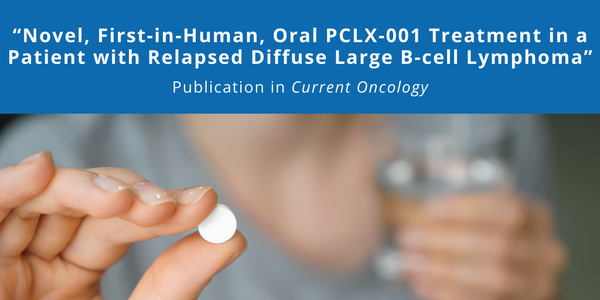Edmonton, Alberta, Canada, March 14, 2022 Pacylex Pharmaceuticals, an oncology company developing a first-in-class, oral drug for a new approach to cancer therapy, today announced the publication in the journal Current Oncology of data from the first patient. The paper entitled “Novel, First-in-Human, Oral PCLX-001 Treatment in a Patient with Relapsed Diffuse Large B-cell Lymphoma” describes how an eighty-six year old woman with relapsed diffuse large B-cell lymphoma (DLBCL) received oral PCLX-001, a small molecule, N-myristoyltransferase (NMT) inhibitor, as the initial patient in a phase 1 dose escalation clinical trial.
In this patient, daily oral administration of 20mg PCLX-001 tablets produced a pharmacokinetic profile suitable for single daily dosing: rapid oral absorption followed by an apparent elimination half-life of 16 hours, without systemic accumulation of drug by day 15. This Phase 1 study is primarily intended to determine the safety of PCLX-001 at escalating doses. There were no dose limiting toxicities and the patient completed their 28-day cycle without incident. Subsequently two additional patients successfully completed the 20 mg dose level without dose limiting toxicities and patients are now being dosed at 40 mg daily.
“We are encouraged that the first patient experience with an NMT inhibitor shows the initial dose to be well tolerated and rapidly absorbed, with a PK consistent with a daily oral drug” said John Mackey, CMO of Pacylex.
All three initial patients were enrolled at the Cross Cancer Institute. Dr. Randeep Sangha, the principal investigator for the study of PCLX-001 at the Cross Cancer Institute in Edmonton, said “our first dose level of PCLX-001 in two relapsed diffuse large B-cell lymphoma patients and a metastatic leiomyosarcoma patient went very smoothly and the safety results encouraged us to escalate to the next dose level and continue to explore its potential as a new treatment for patients”.
Patient enrollment is continuing, and patients have also been dosed at Princess Margaret Hospital in Toronto and are expected to be dosed at Centre Hospitalier de l'Université de Montréal (CHUM) and the BC Cancer Agency in Vancouver. The study will enroll 20-30 patients in the initial phase. Four principal investigators will oversee the clinical study at the four clinical sites in Canada: Dr. John Kuruvilla at Princess Margaret Cancer Centre in Toronto, Dr. Randeep Sangha at the Cross Cancer Institute in Edmonton, Dr. Laurie Sehn at the British Columbia Cancer Center in Vancouver, and Dr. Rahima Jamal at CHUM in Montreal.
This study is registered at ClinicalTrials.gov Identifier: NCT04836195.
PCLX-001 (aka DDD86481) is a first-in-class, small molecule NMT inhibitor originally developed by the University of Dundee Drug Discovery Unit as part of a program to treat African sleeping sickness, funded by Wellcome Trust. Pacylex is developing PCLX-001 in the form of a once-a-day pill initially to treat leukemia and lymphoma. PCLX-001 has also been shown to inhibit the growth of lung and breast cancer tumors in animal models. In leukemia, lymphoma and breast cancer patients, the levels of NMT2 is correlated with survival, suggesting an important biological role in these cancers. In tests using cultured cancer cells in vitro, PCLX-001 is at least ten times as potent as ibrutinib (Imbruvica) and dasatinib (Sprycel), two clinically approved drugs currently used to treat hematologic malignancies.
About Pacylex
Pacylex is a pharmaceutical company targeting hematologic and solid cancers with a new first-in-class therapeutic, headquartered in Edmonton, Alberta, Canada. Pacylex’s technology combines new insights from Dr. Luc Berthiaume of the University of Alberta connecting myristoylation to cancer with a family of high quality myristoylation inhibitors Pacylex licensed from the University of Dundee. PCLX-001 is the lead drug in a new class of NMT inhibitors, enabling Pacylex to exploit NMTs as new clinical targets for cancer treatment. Pacylex initiated clinical studies in Canada in the fall of 2021 in diffuse large B-cell lymphoma and solid tumors. Pacylex is also receiving support from an Alberta Innovates AICE grant in 2020, and the research leading to this breakthrough was supported in part by the Alberta Cancer Foundation and the Cure Cancer Foundation.








